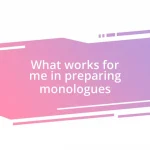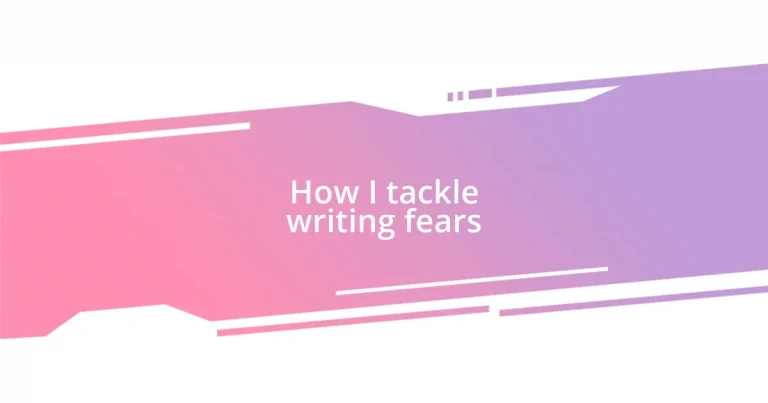Key takeaways:
- Understanding and confronting the root causes of writing fears, such as past criticism and self-comparison, can help reduce anxiety and bolster confidence.
- Incorporating techniques like deep breathing, visualization, and supportive routines can significantly alleviate writing-related anxiety and foster creativity.
- Setting achievable goals and celebrating small successes cultivates motivation and encourages a positive mindset throughout the writing journey.
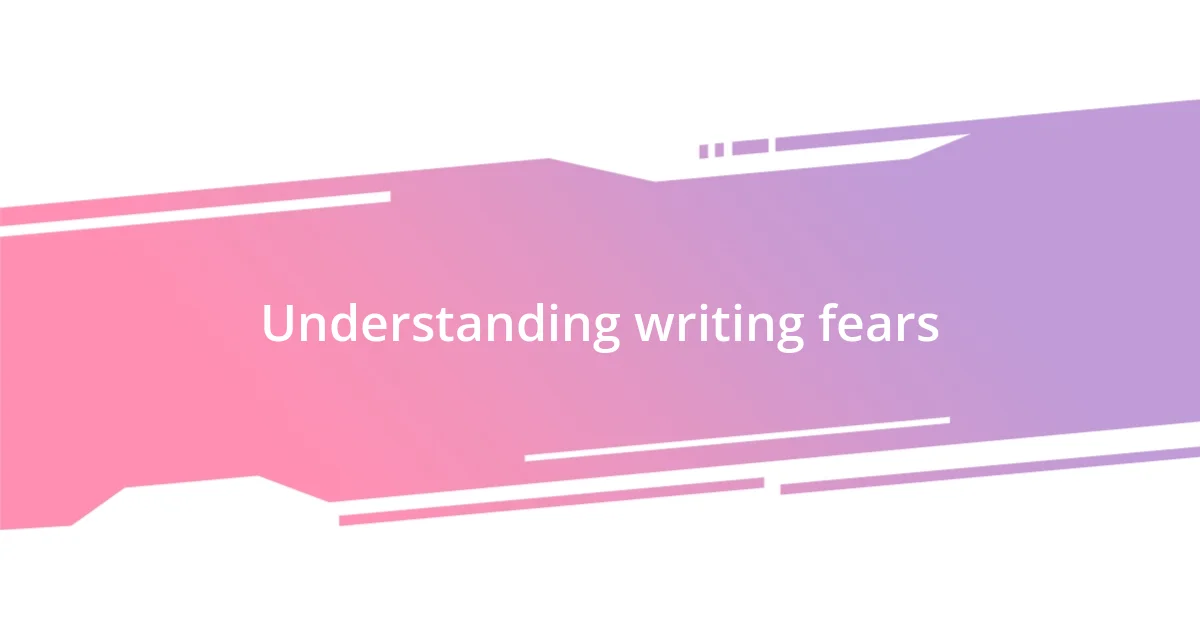
Understanding writing fears
Writing fears can surface for various reasons—fear of judgment, fear of failure, or even the daunting pressure to be perfect. I remember grappling with a nearly paralyzing anxiety every time I had to share my work. It felt like I was standing naked in front of a crowd, waiting for someone to critique every word.
Sometimes, I catch myself wondering why it seems so difficult to put pen to paper, even when I have a million thoughts swirling around my mind. Isn’t it fascinating how the very act of creation can evoke such a spectrum of emotions, from exhilaration to sheer terror? I’ve learned that these fears often stem from past experiences—maybe a harsh critique I received or a mistake that still haunts me. The key lies in understanding where those feelings come from.
Over time, I’ve realized that confronting these fears can be liberating. I recall the first time I shared a personal story—a moment filled with vulnerability. The responses were overwhelmingly supportive, and it hit me: we’re all in this together, clutching our pens and keyboards, wanting to express ourselves but held back by similar fears. Have you experienced this too? If so, recognizing your fear as a shared human experience can make it less intimidating.
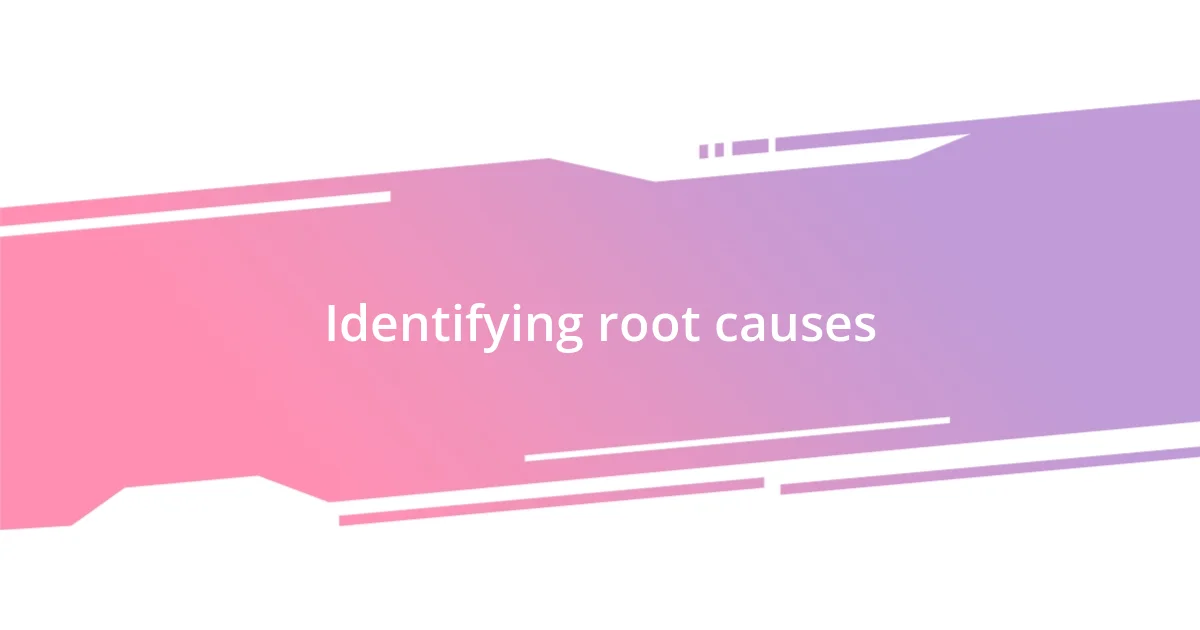
Identifying root causes
Identifying the root causes of my writing fears was a revelation that changed everything. One moment stands out vividly: I was about to read my work at a workshop when a voice in my head whispered, “What if they hate it?” I took a step back and asked myself why that thought invaded my mind. Through reflection, I came to understand that this fear was a byproduct of years of comparing myself to others, igniting a deep-seated insecurity that I needed to address.
To uncover your own writing fears, consider these aspects:
- Past Experiences: Recall any criticism that left a lasting impression on you.
- Self-Expectations: Are you setting unrealistic standards for yourself?
- Comparison: How often do you measure your abilities against fellow writers?
- Fear of Vulnerability: Do you hesitate to share personal stories that reflect your true self?
By investigating these roots, I’ve gained clarity. The fear itself often feels less daunting when I understand its origins, allowing me to tackle writing from a more grounded perspective.
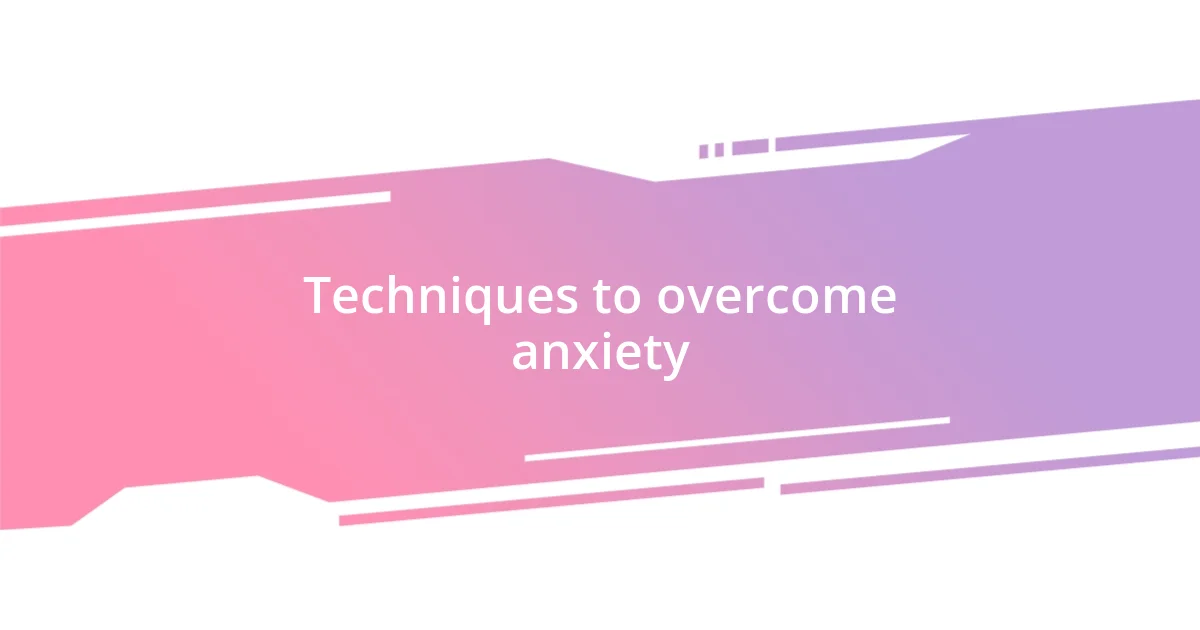
Techniques to overcome anxiety
When anxiety looms over my writing, I often turn to deep breathing exercises. It’s surprising how something so simple can shift my focus. Just a few deep breaths can center my thoughts, clearing away the noise. I remember a time before a big presentation when nerves took over; slowing down my breath helped me regain control, and I was able to articulate my ideas clearly. This technique serves as a gentle reminder that I have the power to calm my mind, even in the most pressure-filled moments.
Visualization is another powerful technique I’ve embraced. I picture myself writing confidently, the words flowing effortlessly as I craft my thoughts. This mental picture not only alleviates anxiety but also builds a sense of ownership over my writing journey. Once, before sharing a chapter of my book, I imagined an encouraging audience applauding my every sentence. That visualization transformed my nervous energy into motivation, making the experience enjoyable rather than frightening.
Finally, establishing a supportive routine around writing has been pivotal. I now include regular short breaks during long writing sessions to keep my mind refreshed. Each pause allows me to reassess my thoughts and reassures me that it’s okay to step back. Like the time I struggled with a particularly tough section of my draft; taking a walk in nature revitalized my creativity. I returned with renewed focus, proving to myself that breaks can foster, rather than detract from, productivity.
| Technique | Description |
|---|---|
| Deep Breathing | Calms anxiety and centers thoughts through deep, intentional breaths. |
| Visualization | Envisions successful writing experiences to build confidence and reduce fear. |
| Routine Breaks | Incorporates short breaks in writing to refresh the mind and bolster creativity. |
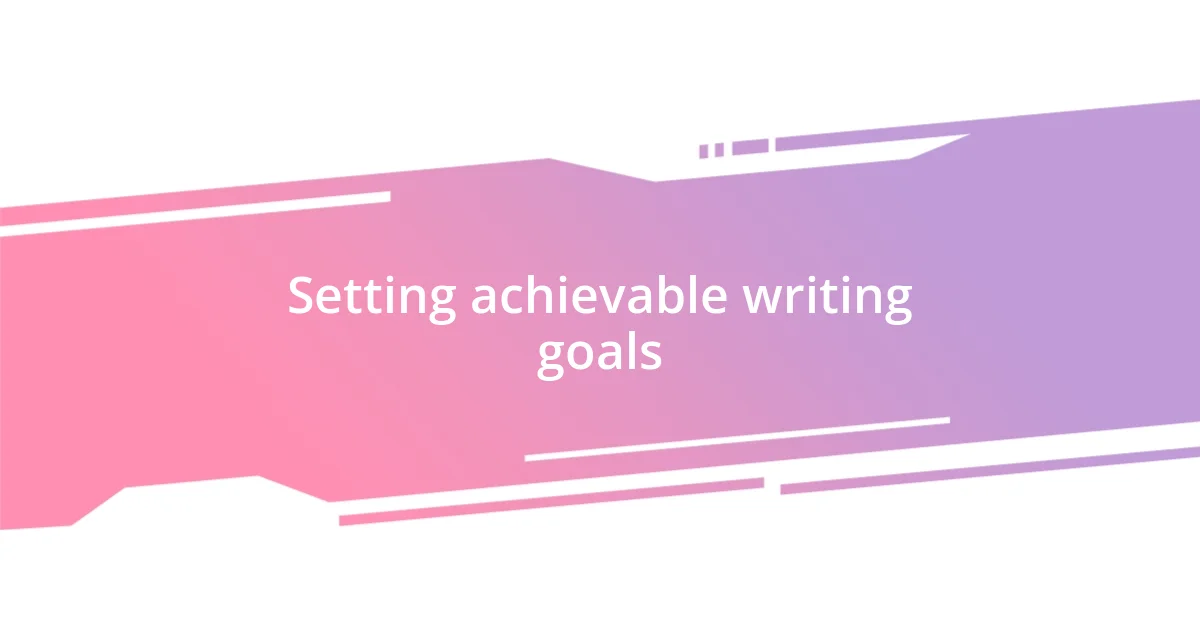
Setting achievable writing goals
Setting achievable writing goals starts with understanding what you genuinely want to accomplish. I often ask myself, “What’s a realistic expectation for today?” This simple question helps me break down my writing tasks into manageable pieces. When I aimed to write an entire chapter in one sitting, I felt overwhelmed. Now, I set daily targets—like completing a specific number of words or paragraphs—which makes the process feel more attainable and less daunting.
Moreover, I’ve learned the importance of celebrating small victories. After finishing a section, I take a moment to acknowledge that accomplishment, no matter how minor it seems. As I reflect on my progress, I often think, “If I can do this today, what else can I achieve tomorrow?” This habit not only boosts my motivation but also reinforces the idea that every step forward counts, even if it feels small.
Finally, adjusting my goals based on my daily feelings can be a game-changer. Some days, I’m energized and can write for hours, while other days, my mind feels heavy. On those tougher days, I’ve learned to adjust my targets — maybe just jotting down ideas instead of full paragraphs. I remind myself that writing isn’t a race; it’s about growth and exploration. Have you ever felt that pressure to produce something perfect in one go? Embracing flexibility in my writing goals has transformed my approach, allowing me to stay committed without the burden of unrealistic expectations.
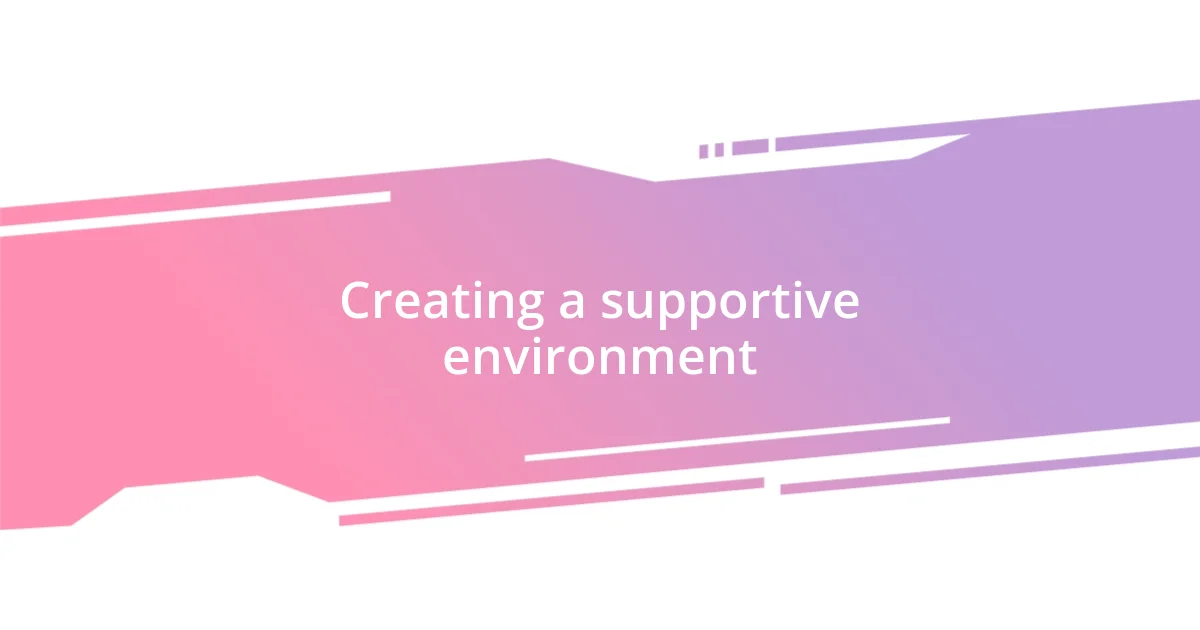
Creating a supportive environment
Creating a supportive environment around writing has been essential for me. When I surrounded myself with people who genuinely care about my work, I noticed my fears started to dissipate. For instance, I joined a local writing group where each member shares constructive feedback. Having that consistent support made me realize that I’m not alone in this journey. Can you remember the last time you felt uplifted by others’ encouragement? It’s truly empowering.
I also believe that my physical space plays a big role in nurturing creativity. I’ve curated a cozy writing nook filled with personal mementos and inspiring books. The atmosphere I’ve created helps minimize distractions; I often think to myself, “If I love my space, won’t my words reflect that comfort?” Artifacts from my travels or framed quotes from authors I admire remind me of my passion and motivate me to write.
Lastly, I make it a point to incorporate positive affirmations into my writing routine. Each morning, I remind myself that my voice matters. On particularly challenging days, I have a mantra I repeat: “My words have power.” There’s something so grounding in declaring that out loud. Have you ever tried affirmations? They can transform self-doubt into determination, helping to forge a more supportive environment within ourselves.
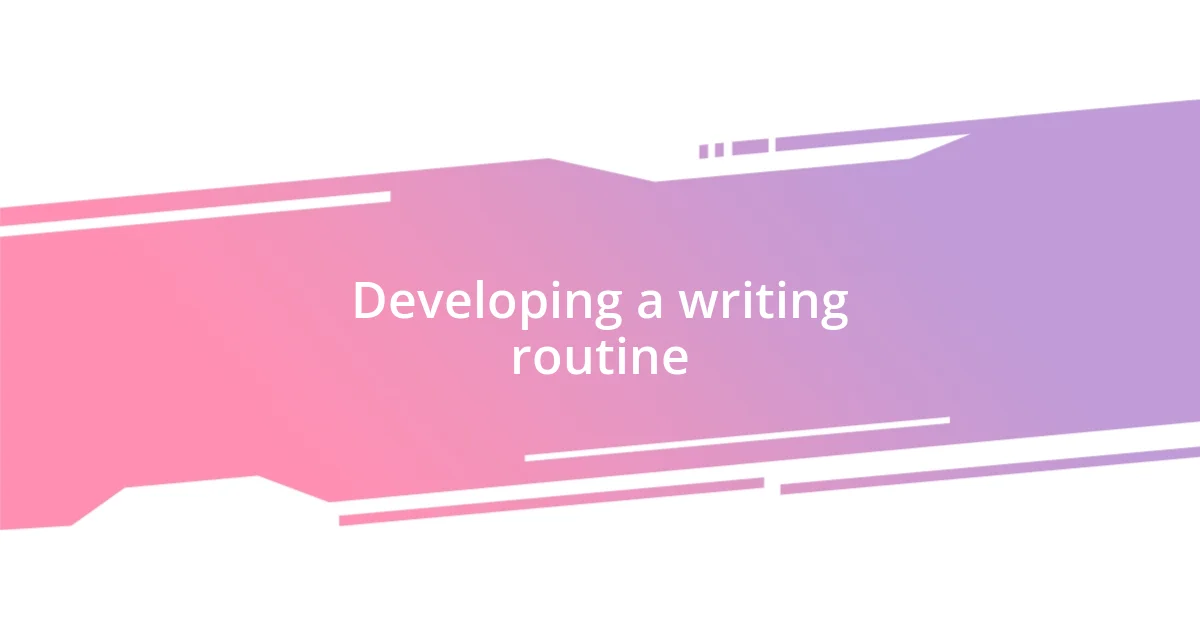
Developing a writing routine
Developing a writing routine has fundamentally changed my approach to overcoming writing fears. I’ve discovered that consistency is key. I typically set aside a specific time each day, even if it’s just 20 minutes, and treat that time as an unmissable appointment. Have you ever felt the relief that comes from knowing exactly when you’ll write? That certainty allows me to channel my thoughts more freely, easing the pressure that often accompanies the blank page.
One thing I’ve found incredibly helpful is incorporating rituals into my routine. For example, I brew a cup of my favorite herbal tea before I start writing. It may seem trivial, but that little act signals to my brain that it’s time to focus and create. What small rituals do you have that help signify the start of your writing session? These moments help me transition my mindset and encourage a flow state where creativity can thrive.
Lastly, I closely monitor my writing energy levels. Some days I’m buzzing with ideas, while others, I struggle just to pen a sentence. On those low-energy days, I don’t push too hard; instead, I might read a few inspiring pages from a favorite book or draft a few lines of thought. This flexibility allows me to remain engaged with my writing without feeling trapped by my own expectations. Isn’t it liberating to know that every writing session doesn’t need to lead to a polished product? It’s this dynamic approach that keeps my routine fresh, allowing my creativity to flourish.

Celebrating small successes
Celebrating small successes has been a game-changer for me in my writing journey. After finishing a first draft, I often take a moment to savor that achievement, no matter how rough the draft may be. I remember one evening, after completing a challenging chapter, I treated myself to my favorite dessert. It felt fantastic! Don’t underestimate the power of rewarding yourself. Isn’t it uplifting to acknowledge your effort, even when the end goal feels far away?
I also keep a journal where I jot down my small writing wins. Whether it’s completing a writing prompt, receiving positive feedback, or simply carving out time to write, I make sure to note it down. There’s true joy in revisiting these entries; it’s like creating a treasure chest of motivation. Have you ever reflected on your progress? Those little reminders can re-ignite your passion, especially during tough times.
Another practice I find deeply rewarding is sharing achievements with friends or writing pals. Recently, I shared my milestone of entering a writing contest with a close friend. Her genuine excitement was contagious, reminding me of the importance of community in celebrating moments that may seem insignificant but feel monumental to us. How often do we overlook our accomplishments? Taking the time to celebrate can transform our mindset from fear to fulfillment, propelling us forward on our writing paths.










